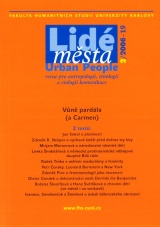Národnost jako jeden z rozměrů identity dětí
DOI:
https://doi.org/10.14712/12128112.3803Abstrakt
In the last decade of the 20th century, the question of national and ethnic identity as it relates to the Czech society became relevant. It was the time of migration movements of European, as well as non-European population, caused by social and economic pressures, which started to have an influence on the Czech Republic’s ethnic composition. Czech scientific community has also included the problem of identity as it relates to nation and ethnics into its area of interest. From the historical point of view, this interest has focused on the development of collective mentalities and concepts of self-awareness and awareness of the World. From the social psychological point of view, this interest has focused on individual socialization process, learning process and acceptance of social roles; from the ethnological point of view on cognition and analysis of culture symbolism as means of self identification of individuals and groups, and in this context also on quality and functionality of mutual ethnic relationships. In our approach, we consider national identity as conscious self-integration of an individual into national community, defined either in the framework of primordial or constructivist concept. We perceive it as self-integration with inherent solidarity with this community, recognition of its identity and awareness of “us – them” polarity. At the beginning of the 21st century, the Czech primary school is becoming an environment where pupils of different ethnic origins meet ever more frequently, even surpassing ethnic composition of the Czech Republic’s population. Children are confronted already in primary schools through real interactions with ethnic and cultural opposition: us – them, I – other. Trough everyday contacts they can define not only their attitudes toward ethnically and culturally different, but also their own relationship to national identity. Teachers enter this spontaneous process with targeted pedagogic goals. Multicultural education cultivates pupil’s opinions: They guide them to respect and recognize equality of other ethnic entities, to tolerate their cultural differences, and to eliminate ethnic barriers. Question remains how this educational process effects child’s feeling about themselves? How children define, in the framework of conflicts between school education, own experience and family influence, their relationship to themselves as a personality living in a certain culture and tied with certain national society through their own family origins?
Stahování
Publikováno
Jak citovat
Číslo
Sekce
Licence

Tato práce je licencována pod Mezinárodní licencí Creative Commons Attribution-NonCommercial-NoDerivatives 4.0.


